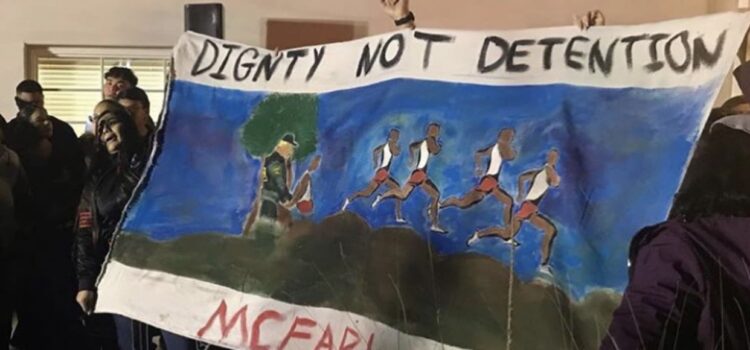
The American Civil Liberties Union Foundation of Southern California, with attorney Paul Nicholas Boylan, filed a lawsuit Monday against the city of McFarland and its city council, according to a news release.
The suit says the McFarland City Council violated the Brown Act by restricting public access to meetings in which the council voted to approve permits that would have allowed The GEO Group, Inc. to turn two state prisons in McFarland to 1,400-bed U.S. Immigration Detention Centers.
“While technology can be a tool to ensure wider government transparency, in the middle of a pandemic McFarland used technology to do just the opposite,” said Julia Morgan, staff attorney at the ACLU SoCal. “A pandemic, however, does not void Californians’ right to attend, observe, and provide comment during the meetings of their public bodies, and we are confident that the court will agree.”
The lawsuit is asking the court declare the actions taken by the McFarland City Council on April 9 and April 23 null and void.
The vote on GEO’s permit requests goes back to February of 2020 when McFarland’s Planning Commission denied the request for permits. That night, hundreds of people in opposition of GEO protested outside.

Two months later on April 9, the council appointed Eric Rodriguez, a former GEO employee to fill a vacancy on the city council. Public comment was restricted — a violation of The Brown Act, according to the lawsuit, and no translation services were provided.
Prior to the April 9 meeting, City staff met privately with GEO representatives and Mr. Rodriguez and discussed GEO’s pending applications, according to the lawsuit.
“In short, the City made sure to hear from GEO on the Council vacancy but was less keen on hearing from the public,” the lawsuit says.
Just a few weeks later on April 23 — when the council approved the permits — residents were only able to take part over Zoom or phone call due to the COVID-19 pandemic. There was a 100-person limit on the zoom call, leaving hundreds of people unable to partake in the meeting.
The residents of McFarland and immigrant rights advocates urged the city council to postpone the appeal hearing to a time when the public can safely gather to take part in the meeting.
“I’m getting quite a bit of messages from community members who are trying to log into the call, but the meeting has reached the maximum 100 people,” Alex Gonzalez, a community organizer for Faith in the Valley, said at April’s meeting when the council approved the permits. “We suggest the meeting be postponed until we have a democratic process, and people can participate.”
However, the council denied that request.
“Even if tonight’s city council meeting was a regular meeting, we would not be able to hold 100 people,” McFarland Mayor Sally Gonzalez said at the April meeting. “We have given you more people that can attend.”
At the time of the April meeting, Interim McFarland City Manager Larry Pennell told Kern Sol News the requirements of The Brown Act were waived due to the pandemic.
In March, Governor Gavin Newsom issued an Executive Order saying, “All requirements in . . . the Brown Act expressly or impliedly requiring the physical presence of members, the clerk or other personnel of the body, or of the public as a condition of participation in . . . a public meeting are hereby waived.”
However, the lawsuit says the purpose of the Executive Order was to prevent the spread of COVID-19.
“The Executive Order did not cite any other interest it sought to protect and did not authorize any limitations on access to public meetings other than physical ones,” the lawsuit says. “Governor Newsom left in place all other provisions of the Brown Act and urged public agencies to adhere as closely as possible to the Brown Act ‘to maximize transparency and provide the public access to their meetings.’”
“In April, when the McFarland City Council held two meetings crucial to the project, the protesters were almost entirely shut out,” the ACLU Foundation of Southern California said in a news release. “And with opposition voices suppressed, the project was approved.”
The council, according to the lawsuit, not only violated the Brown Act — also known as the open meetings law — but also the California Constitution.
The suit says the City violated the public’s, “constitutional and statutory rights to petition government and observe and/or participate in the conduct of the people’s business on matters of great public interest and importance.”
“The purpose of California’s Brown Act is to protect and expand every person’s constitutional rights to attend, observe and speak during public agency meetings,” said attorney Boylan, who specializes in open government law. “The McFarland City Council knowingly violated the public’s rights when it prevented interested people from participating in decisions vital to the public welfare. I have no doubt the court will invalidate the city’s unlawful acts.”
The suit was filed on behalf of three residents of Kern County, Stephanie Padilla of Bakersfield and two residents of McFarland who wish to remain anonymous because they fear unwarranted scrutiny and backlash from officials, according to a news release.